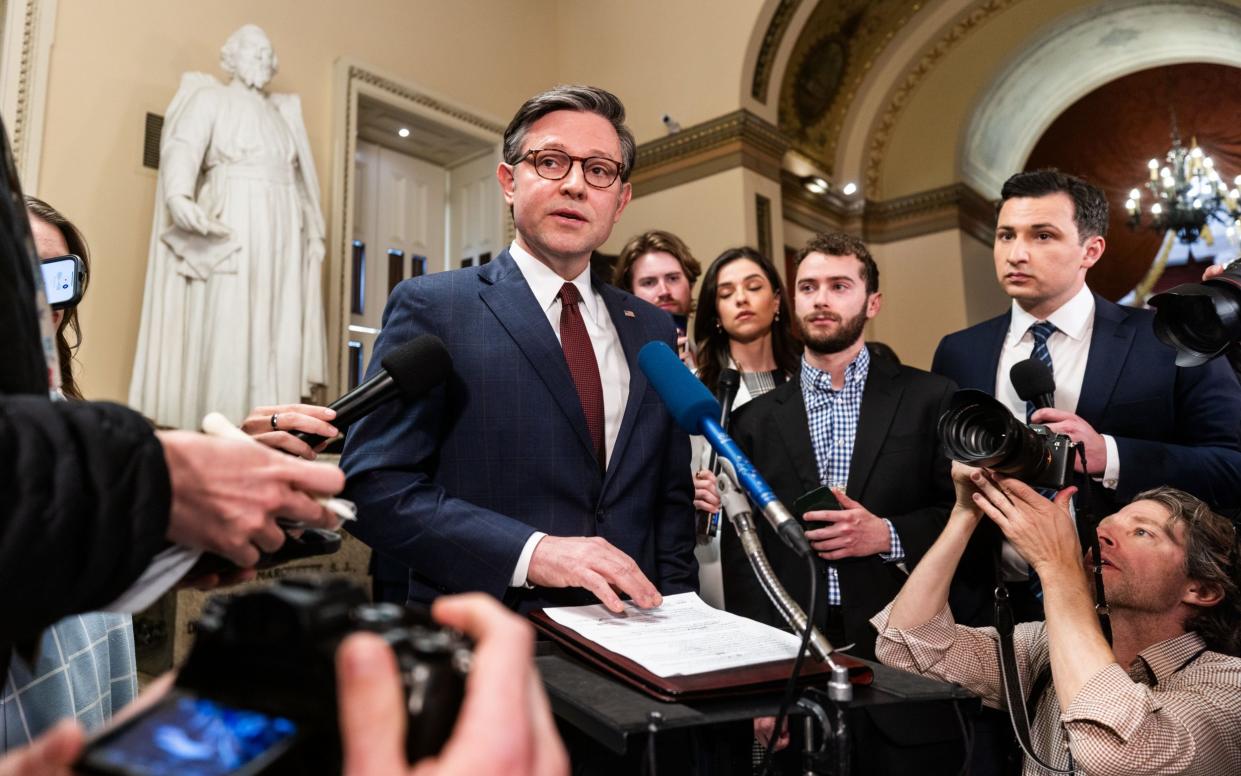Mike Johnson faces ousting as US House speaker over Ukraine support

“My philosophy,” Mike Johnson told reporters before introducing a $61 billion Ukraine aid package to the House of Representatives, “is do the right thing and let the chips fall where they may.”
“If I operated out of fear over motion to vacate, I would never be able to do my job.”
The bill has passed, the chips have fallen, and Mr Johnson may not be in that job for much longer.
Marjorie Taylor Greene, the vehemently anti-Ukraine representative from Georgia, has already accused Mr Johnson of treachery and threatened to lead a motion to oust him.
She has yet to act on the threat, but with 112 Republicans – a narrow majority of their representatives – voting against the bill, Mr Johnson could only survive with Democrat support.
Mr Johnson knew Saturday’s vote would anger the America First wing of the Republican party where he made his political home and which installed him as speaker in the first place.
“He was torn between trying to save his job and [doing] the right thing,” Michael McCaul, the House Foreign Affairs chairman, told CNN. “He prayed over it.”
That personal dilemma likely explains months of delay that undoubtedly cost Ukrainian lives and has helped Russia make battlefield gains.
As a rank and file member of the House of Representatives he joined Right-wing colleagues in opposing Ukraine aid.
And shortly after becoming House speaker in October he vowed not to allow Ukraine aid to come to a vote until his party’s demands for harsh measures to protect America’s southern border were met.
He stuck to that decision even after Voldymyr Zelensky personally explained the desperation of the situation at a meeting in Washington in December.
Painstaking negotiations
In February Republicans rejected a painstakingly negotiated deal to take account of those concerns after Donald Trump criticised it.
The consensus among well-connected observers, including top officials in allied governments, was that Donald Trump had ordered and bullied Republicans to block aid for his own political ends.
But Mr Johnson, who had been present in classified intelligence briefings, was privately coming to terms with the gravity of the situation.
“All of a sudden he’s realising that the world depends on this,” Mr. McCaul told The New York Times.
The key meeting appears to have come in the Oval Office in February, when Bill Burns, the head of the CIA, made clear that failure to pass aid could doom Ukraine.
A firm Christian, he was struck by stories of the devastation unleashed by Russia.
Conversations with Mr Zelensky, who phoned Mr Johnson again in March to urge to explain why a “quick passage of US aid to Ukraine by Congress is vital”, also appear to have made an impression.
“I really do believe the intel, and the briefings that we’ve gotten,” Mr Johnson said when a reporter asked him on Wednesday why he was suddenly willing to risk his job.
“I believe that Xi, and Vladimir Putin, and Iran really are an Axis of Evil, I think they are in coordination on this. I think that Vladimir Putin would continue to march through Europe if he were allowed, I think he might go to the Balkans next, I think he might have a showdown with Poland or one of our Nato allies.”
There was also, he admitted, a personal consideration. One of his sons is due to enrol in the US naval academy this Autumn.
“This is a live-fire exercise for me, as it is for so many American families,” Johnson told reporters. “This is not a game, this is not a joke.”


